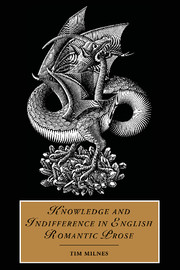Book contents
- Frontmatter
- Contents
- Acknowledgements
- Introduction: Romanticism's knowing ways
- 1 From artistic to epistemic creation: the eighteenth century
- 2 The charm of logic: Wordsworth's prose
- 3 The dry romance: Hazlitt's immanent idealism
- 4 Coleridge and the new foundationalism
- 5 The end of knowledge: Coleridge and theosophy
- Conclusion: life without knowledge
- Notes
- Bibliography
- Index
- CAMBRIDGE STUDIES IN ROMANTICISM
4 - Coleridge and the new foundationalism
Published online by Cambridge University Press: 22 September 2009
- Frontmatter
- Contents
- Acknowledgements
- Introduction: Romanticism's knowing ways
- 1 From artistic to epistemic creation: the eighteenth century
- 2 The charm of logic: Wordsworth's prose
- 3 The dry romance: Hazlitt's immanent idealism
- 4 Coleridge and the new foundationalism
- 5 The end of knowledge: Coleridge and theosophy
- Conclusion: life without knowledge
- Notes
- Bibliography
- Index
- CAMBRIDGE STUDIES IN ROMANTICISM
Summary
A chain without a staple, from which all the links derived their stability, or a series without a first, has been not inaptly allegorized, as a string of blind men, each holding the skirt of the man before him, reaching far out of sight, but all moving without the least deviation in one strait line. […] Equally inconceivable is a cycle of equal truths without a common and central principle, which prescribes to each its proper sphere in the system of science.
Samuel Taylor Coleridge, Biographia LiterariaRomantic writing oscillates between knowledge and knowledge-indifference. It moves between philosophy's conception of knowledge and a more holistic perspective on ‘life’; between a desire for foundational truth and an acceptance of being as something we are always already in. These are irreconcilable but incorrigible attitudes, the products of Hume's ultimatum to philosophy to justify its linkage of truth and value which more recently has become a challenge to justify its connection of truth and meaning. The Romantics express what it is to think and live in this condition of ambivalence, producing a mode of discourse which is tactical rather than strategic, oscillating between earnest epistemological quest and an indifference to knowledge which is sometimes playful and ironic, but involved with exploring reality in a way which avoids, as Andrew Bowie describes the German Romantics' bête noire, ‘the separation of cthe everyday “life world” from the systematically determined spheres of science, technology and modern bureaucracy’.
- Type
- Chapter
- Information
- Knowledge and Indifference in English Romantic Prose , pp. 144 - 175Publisher: Cambridge University PressPrint publication year: 2003

